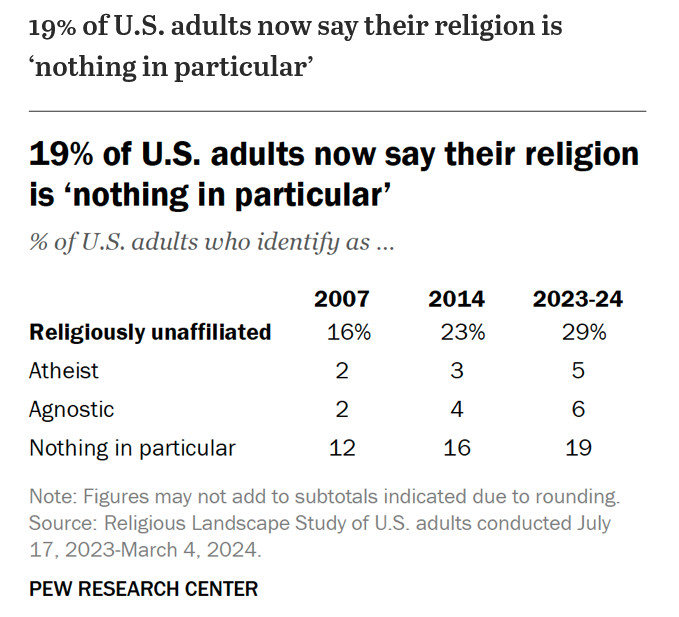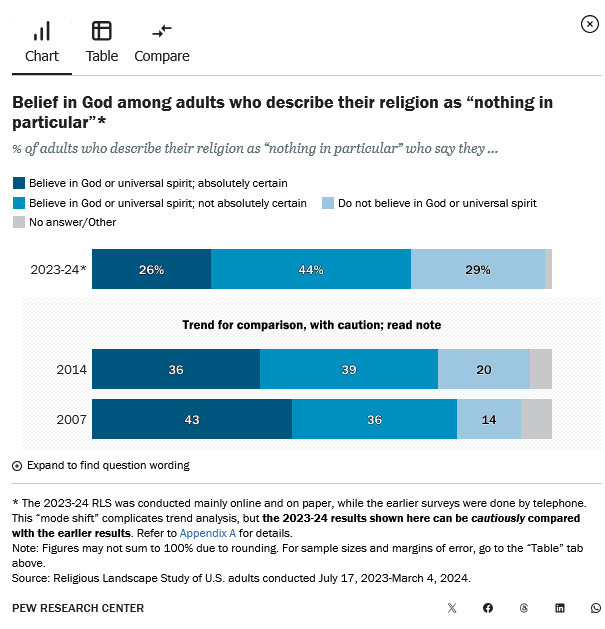Just the facts to the best of your knowledge-no opinions as to why or why not. Thank you.
This 2021 data says that Trump got 14% of the atheist vote in 2016, but only 11% in 2020. That’s pretty much in line with this Pew study looking at party identification in general.
That’s pretty impressive, but runs second to Black Protestants, who were at 7%-9%. Inexplicably (to me), Trump actually got slightly more of the Muslim vote the second time around, 14%-15%.
Muslims tend to be socially conservative, as immigrants often come from regimes that are autocratic or theocratic, and most feel pretty neglected by the mainstream Democratic Party even before it started openly ignoring humanitarian crimes and genocide in Gaza. So it isn’t too surprising that a non-trivial number of Muslims look at Trump and decide that he is the lesser of two weevils.
Stranger
I saw an analysis of voting in Michigan that said this - that a lot of more devout Muslims have very conservative leanings at odds with more liberal urban society, and will vote for more conservative candidates. it wasn’t about Palestine.
Presumably something similar applies with atheists, or any other group in society. There is a segment with rather conservative or prurient views about the trends of social mores who will vote for the person espousing “family values”, possibly without critical analysis.
Well, some subset of atheists are sociopathic Ayn Rand types, who think it’s a great virtue to vote solely in accordance with their own economic self-interest. I’m guessing there are more of those types among the Trumpy atheists than there are homophobes. (Actually, I’m sure they’re out there somewhere, but I don’t think I’ve ever met or heard of a seriously homophobic atheist)
Not really looking for guesses or assumptions.
[Moderating]
How many atheists did or did not vote for Trump is relevant to this FQ thread. Why they did or did not, is not. Save that for the political forums.
No, it really doesnt quite say that. It says lost a good amount of ground among the religious unaffiliated,
The “Religiously unaffiliated” altho certainly include Atheists, would also have agnostics, Christians unaffiliated with any church, and Deists- those that have no organized religion or church but believe in “Divine Providence’ as per the Declaration of Independence- many of the Founder were Deists.
Today, about 28% of U.S. adults are religiously unaffiliated, describing themselves as atheists, agnostics or “nothing in particular” when asked about their religion.At Pew Research Center, we get lots of questions about this group, often called the “nones.” What do “nones” believe? Are they opposed to religion? What are their views about science? Is their growth good or bad for society, and why?
Our survey data shows:
- Most “nones” believe in God or another higher power. But very few go to religious services regularly.
Atheists are such a tiny group in America, tracking their votes would be very difficult. Some estimates says that maybe 4% are Atheists. They are of course included in that 28%.
Just look at the damn cites, man. Both of mine clearly break down the “none” group into various subsets, which include atheists, right at the top of the page. Your countercite is an entirely different study which…well, also breaks down the “nones” group into subsets including atheists, but does it further down the page.
Other than that, excellent point.
(Also, please note that they include data for Jews, Muslims, Hindus, and some other groups that comprise way less than 4% of the population.)
I could not find any such breakdown in your first cite, but yes, there it is in your 2nd- However, that 2nd cite did link to my Pew cite!
Good point.
But, to go back to the OP’s question - distinguish between those who are “Trump supporters” and those whose convictions motivate them to simply vote against the opposing party, disliking the messages of the Democrats, the “hold your nose and vote” types.
I’ve been waiting for the Pew treatment of the 2024 election and it finally came out in late June. Page 2 provides a helpful chart on religion.
11% of athiests voted for Trump in 2020. That rose to 15% in 2024. Data from 2016 is not available. Among agnostics, the Trump share rose from 14 to 18% from 2020 to 2024.
For the religiously unaffiliated, support grew from 24% in 2016 to 26% in 2020 and 28% in 2024.
So the needle has moved by maybe 4 percentage points between 2020 and 2024. Maybe it rose 2 percentage points between 2016 and 2020.
I’m not sure what “Nothing in particular” means, but that metric went from 27 to 36 to 38% support for Trump over the 3 elections.
Of course you need to consider the baseline. Trump received 47% of the vote in 2020 and 50% in 2024, a gain of 3 points. The overall change in the atheist and agnostic vote was comparable to that (though the within-group growth in support was higher, given the low base to start with).
Regarding the OP, take an average of 11 and 15 and you get 13% support for Trump among atheists.
I assume that is more about apatheism or post-theism than any beliefs about theism or non-theism. Its like people asking what they think about zeus, and they say they don’t give a shit or think about it.
I see that, “Nothing in particular” comprises the bulk of the religiously unaffiliated.
Only 29% of Nones do not believe in God or a universal spirit:
As I understand it, most "nothing in particular"s are people who are spiritual (i.e. they believe in some kind of supernatural beings) but don’t belong to any organized religion. They’re often lumped into the category “None” along with atheists and agnostics. That’s misleading because the two groups have very different demographics. For example, A&As tend to be highly educated while NiPs have much lower educational achievement.
I found a survey of religiously unaffiliated voters from 2023 that asked about Trump support. Headline figures: favourable views of Trump fell from 30% in 2020 to 20% in 2023 for all religiously unaffiliated, and from 20% to 9% among atheists specifically over the same time period. Not sure how that squares with only 11% of atheists voting for Trump in 2020. It would be more useful if they had favourability figures for all Americans as a comparison.
It’s possible to think that someone is doing an OK job, but still want to replace him with someone you like better.
None of the atheists I know would touch trump with the Devil’s middle finger.
Dan
I don’t know how Trump could have won. Nobody I know voted for him.
We should be grateful that there is a large segment of the population we don’t know. When about six million democrats failed to show up to vote against trump the second go-round, for instance, I had no idea that so many of my “fellow” democrats were bigoted misogynists. “Vote for a black woman? I’ll just stay home!”
Dan


